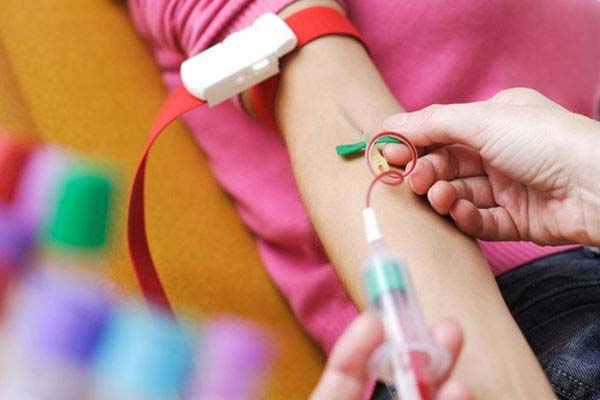In the past times, the doctors used to check 18 points in the human body and where ever they felt that the patient had pain by pressing them firmly was diagnosed with the diseases fibromyalgia.
However, with time it was evaluated that fibromyalgia could be to anyone who has had severe pain for three months and that too severe pain.
Although there is no specific test for fibromyalgia, your doctor might do a specific blood test to confirm if you have fibromyalgia.
Your blood test might include:
- A complete blood count of you
- Erythrocyte sedimentation rate
- Thyroid function test
- Rheumatoid factor
- Cyclic citrullinated peptide test
There is no specific test or treatment for fibromyalgia. Treatments for fibromyalgia include medication and self-care.
Medications and therapy are the best way to reduce the symptoms of fibromyalgia.
Your doctor might figure out you have fibromyalgia through a blood test or by doing an X-ray.
Changes in the functioning of the brain and spinal cord might also detect if a person has fibromyalgia.
Symptoms of fibromyalgia might reduce the chances of test
Since there is no specific way of finding out if a person has fibromyalgia, it is best if we could have a good look at the symptoms of fibromyalgia.
This way, we can check if the symptoms in an individual persist, we can always figure out he has fibromyalgia.
These symptoms include:
The simplest definition of the symptoms of fibromyalgia is that you ache all over and have immense pain in each and every part of your body.
Some of the most common symptoms include:
- You have severe muscle pain, burning, itchiness, twitching or tightness.
- You feel weak or lethargic in performing routine work.
- You have insomnia, or you cannot sleep well.
- You feel nervous, depressed, stressed or worried
- You have trouble concentrating and you forget stuff called as fibro fog
- You have tender points
- Frequent headaches
- The slow and confused state of mind and speech
- Extreme tiredness
- Insomnia
- Irritable bowel syndrome
- Migraines
- Sensitivity to pain, some foods and to smoke
The doctor could take a look at the patient record of experiencing these kinds of pains and if an individual experience these kinds of pains in a very severe state and has continuous pain since 3 months or more then it definitely means that he is experiencing from fibromyalgia.
Diagnosing fibromyalgia can be a difficult task
A very experienced doctor might even take time in order to diagnose it. This can be very frustrating for both the doctor and the patient.
The first thing which doctors do is that they rule out the other conditions that might have some similar symptoms of fibromyalgia.
People who experience fibromyalgia may find it difficult to adjust to the environment and be social as people believe that patients who have fibromyalgia look very normal on the outside.
This can be a real problem for patients experiencing fibromyalgia as their friends and family members do not understand why appointments are being canceled.
As there is no specific taste for diagnosing fibromyalgia, your doctor might look at some things that are common among patients in order to diagnose this disease.
The first thing which the doctor will assess the patient having fibromyalgia is the pain.
If the pain is widespread in the entire body and remains constant for a long time, there might be a chance that it is fibromyalgia.
Chronic fatigue and exhaustion even on performing the smallest of tasks and the inability to perform normal routine work might even lead to the fact that the patient has fibromyalgia.
Unrefreshed sleep is also one of the major factors of fibromyalgia as patients who have fibromyalgia find it either very hard to sleep or if they sleep, they always wake up feeling more tired than ever before.
Tenderness in the body is another heavy symptom of a person who has fibromyalgia, handshaking and hugging even might be very painful for the patient.
These are normal routine activities and the doctor will easily find out and diagnose fibromyalgia.
Concentrating on things and forgetting stuff is also a major sign of a person experiencing fibromyalgia and patients who have fibromyalgia have a hard time concentrating on things and they even develop a habit of forgetting the important stuff.
These concentration and memory problems are also called fibro fog and this is extremely common in people who have fibromyalgia.
Thus, these are the tests that a doctor might take when he wants to find out if his patient is experiencing fibromyalgia or not.
There is no specific test for fibromyalgia and so whenever a person is facing any of these symptoms, the doctor who is experienced in a finding of this disease will take a note of these symptoms and reach to the conclusion.
What else can you do in order to treat fibromyalgia?
Your physical therapist might use a variety of tools for fibromyalgia patients.
Some of the tools which a physical therapist uses include:
- A deep tissue massage
- Water aerobics, aerobic conditioning
- Exercises for pain relief
- Strengthening and stretching exercises
- Transcutaneous electrical nerve stimulation or TENS units
- An ultrasound
It is not necessary that a physical therapist might make use of all of these techniques in order to treat fibromyalgia.
He might use one of them or even all of them depending on the severity of the condition or the intensity of the pain.
Some other tests for fibromyalgia
Researchers have led to the conclusion that there are other tests for fibromyalgia which your doctor will want to take in order to diagnose fibromyalgia.
Some of the tests include:
- Antinuclear antibody test
- Vitamin D test
- Genetic markers
- Calcium and phosphate levels
- Thyroid tests
- Liver and kidney tests
- Rheumatoid factor tests
- Complete blood count
- Creatine phosphokinase
You should remember that to diagnose fibromyalgia might be a time to consume and may take up a lot of time.
It is important that you should be informed about your condition and you should ask the doctor whatever questions you have about your illness.
With proper tests and their results, your doctor can diagnose fibromyalgia.
Follow Us on Pinterest
Pin it if you find it helpful and to Keep notified with our new articles

